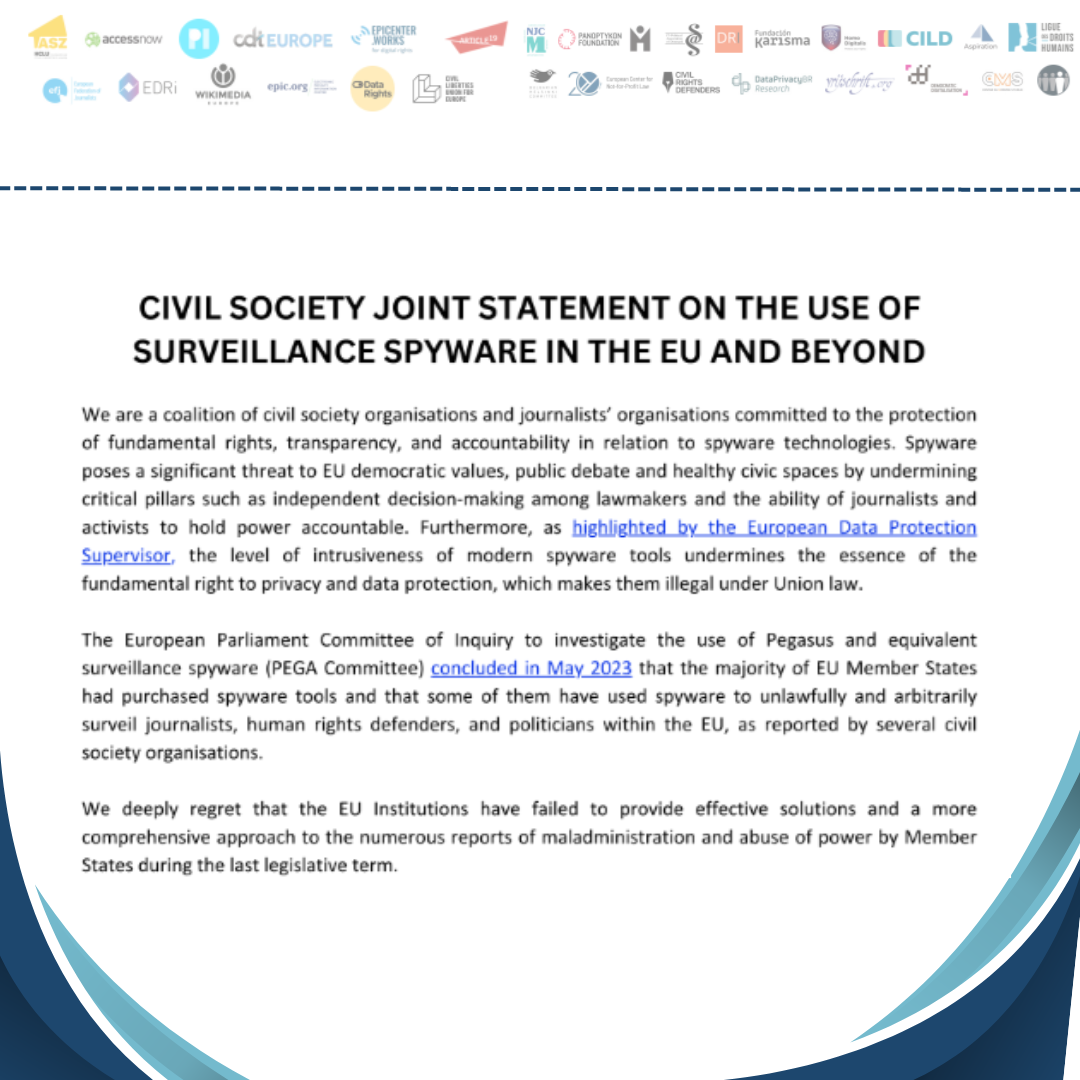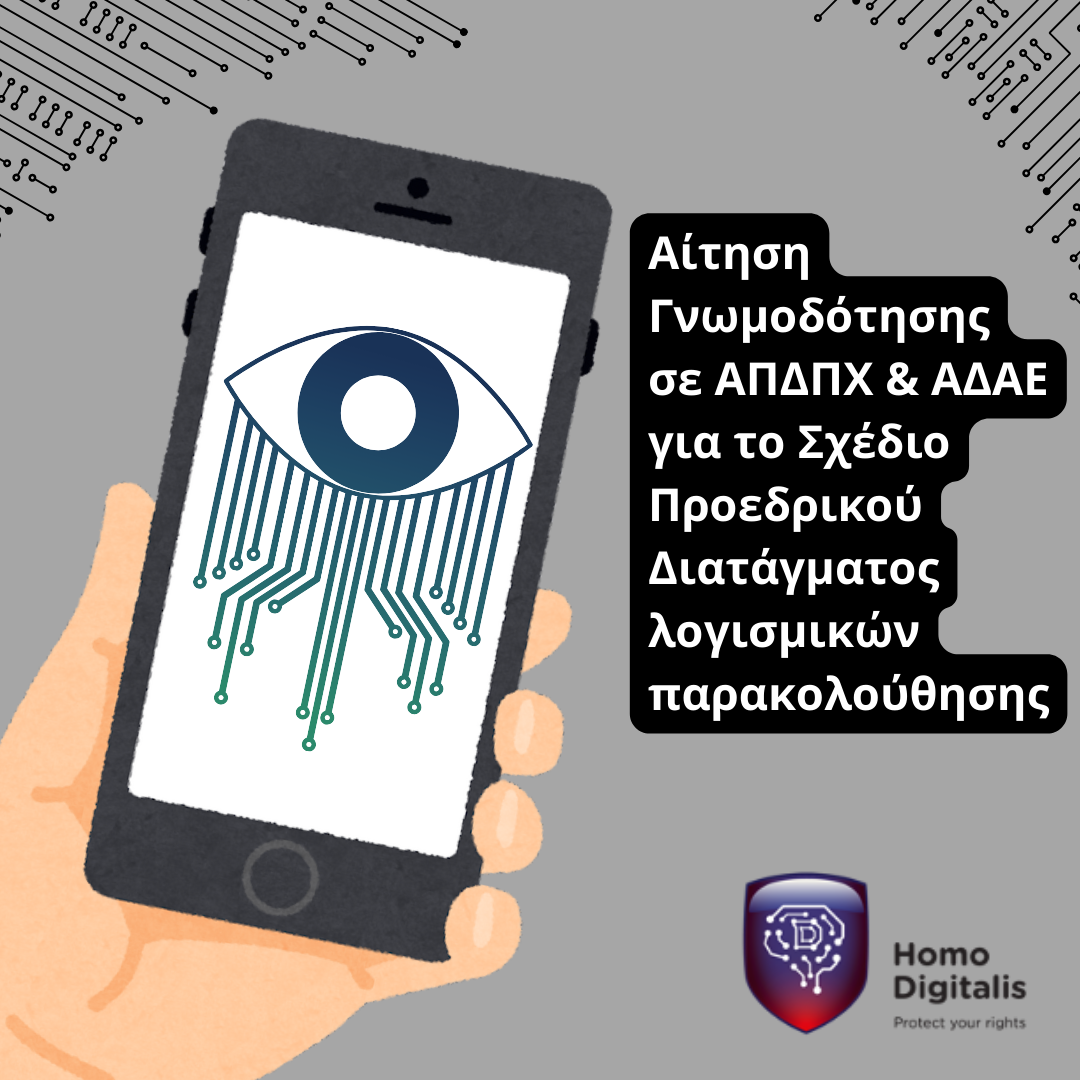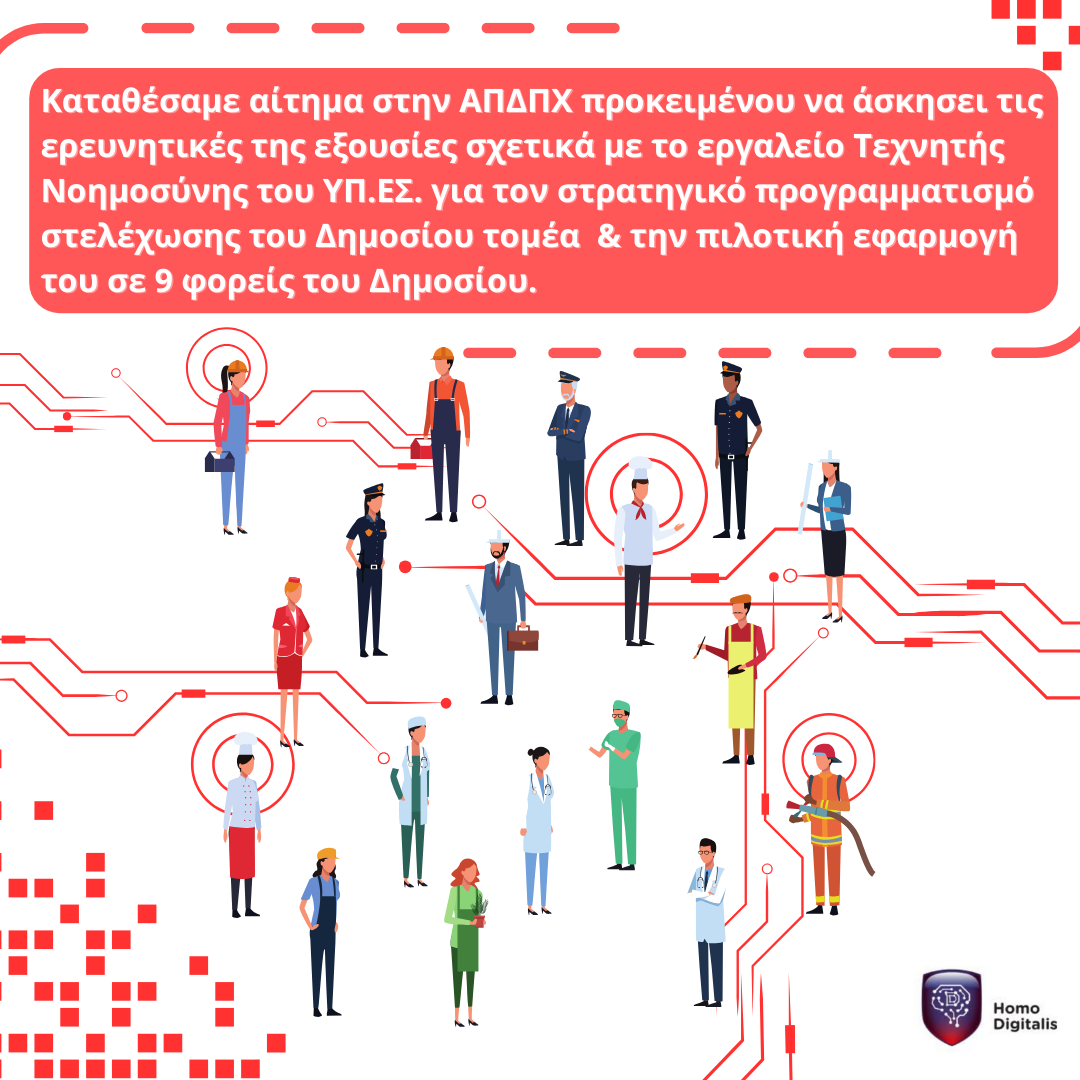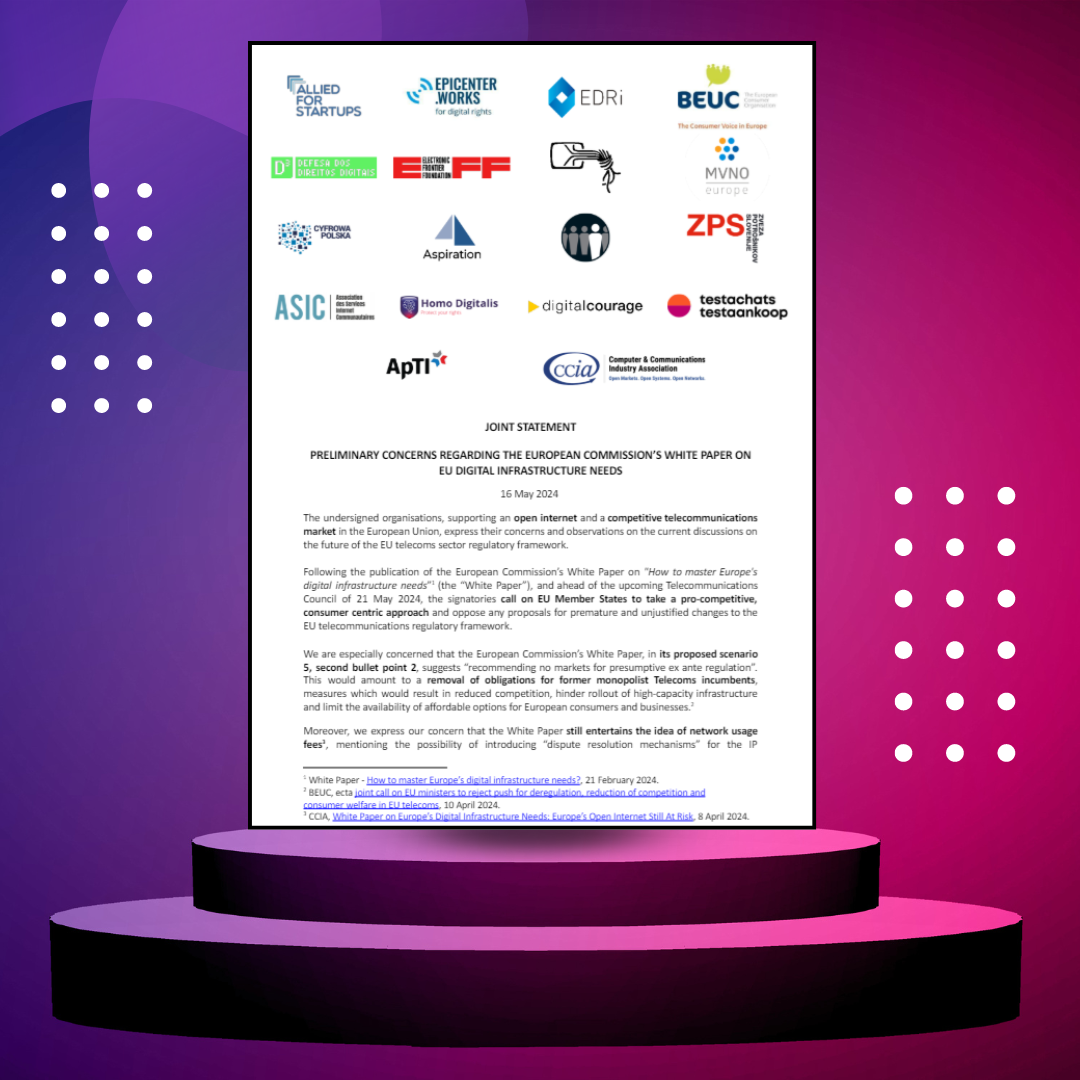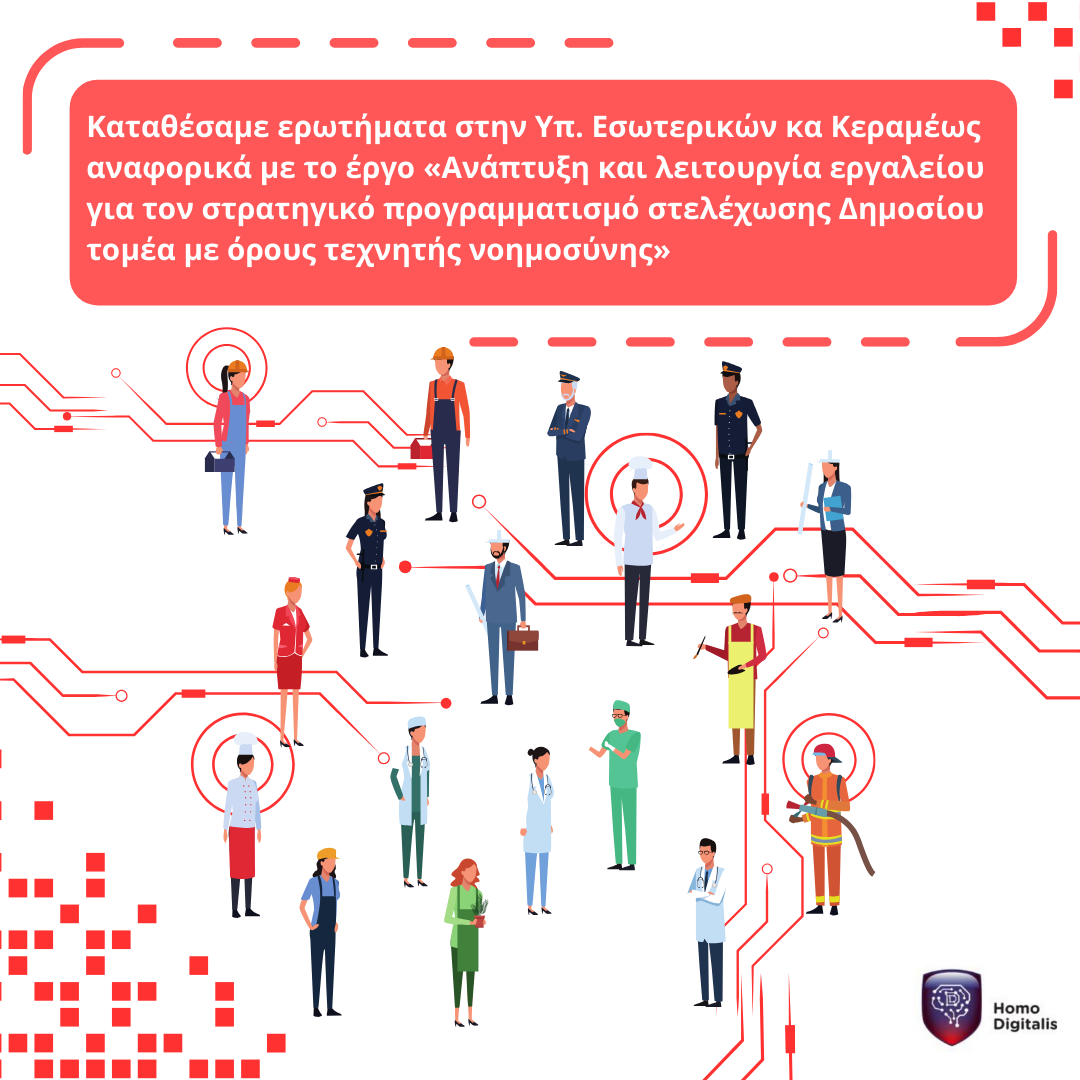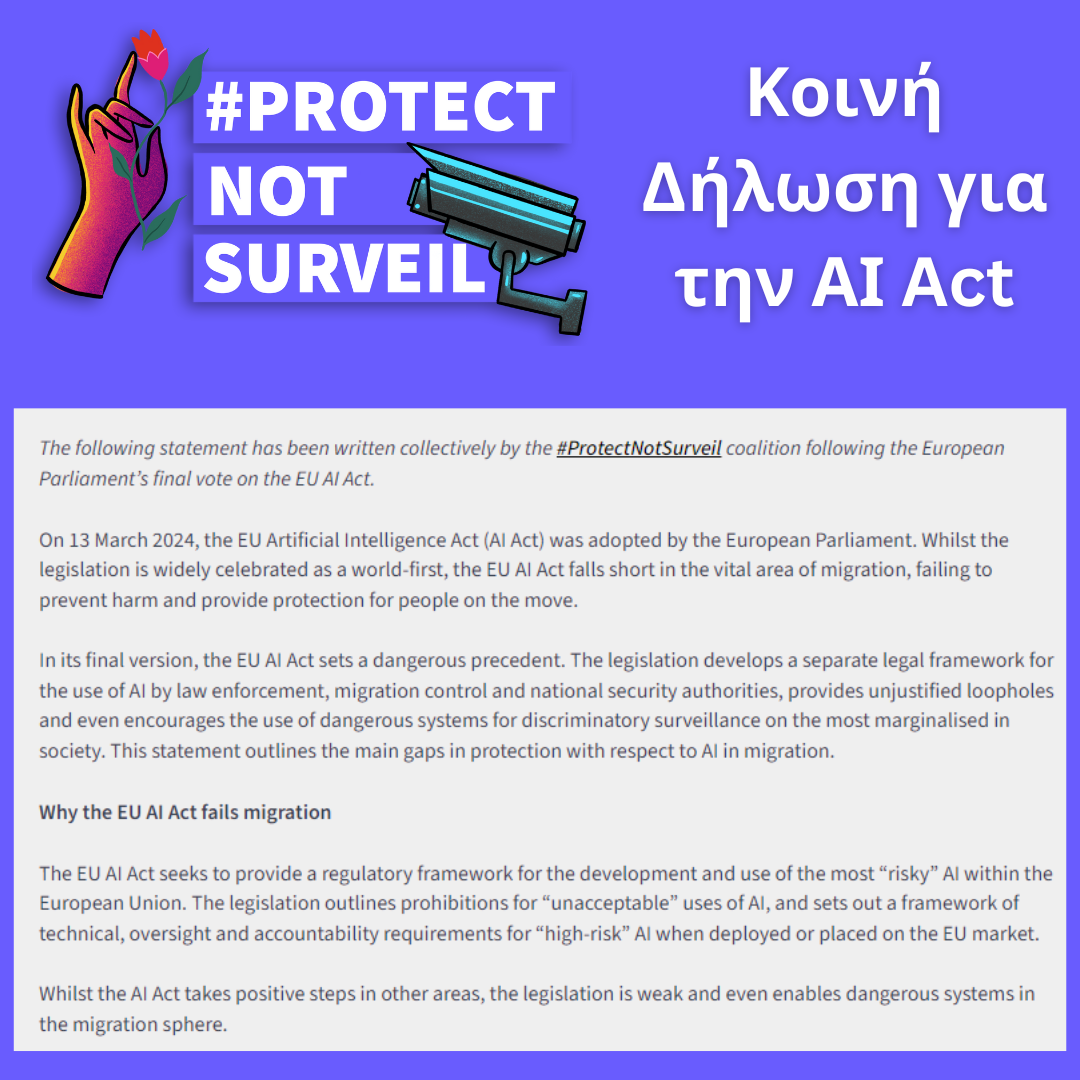Civil Society Common Statement: United Against Spyware Abuse in the EU and Beyond
Spyware isn’t just a privacy issue — it’s a threat to the very foundations of our democratic values. By undermining independent decision-making, restricting public debate, and silencing journalists and activists, spyware erodes the pillars of a healthy civic space.
As new European Union institutions prepare to take office following the EU elections, the growing threat of spyware has become a pressing global concern that demands immediate attention.
On Tuesday 3/9, Homo Digitalis joined Center for Democracy and Technology Europe (CDT Europe), alongside 30 civil society and journalists' organisations in publishing a joint statement urging the incoming EU institutions to prioritise action against the misuse of spyware in the new legislative term.
Some of our coalition’s key recommendations include:
- A ban on the production, sale, and use of spyware that disproportionately harms fundamental rights.
- Stronger export controls to prevent the misuse of these technologies beyond the EU.
- Transparency and accountability in government contracts involving spyware.
As Silvia Lorenzo Perez, Director of CDT Europe’s Security, Surveillance & Human Rights Programme, puts it: "The incoming EU institutions have the opportunity to correct the failures of the last legislature by taking concrete and decisive action against the abuse of spyware surveillance."
The new EU institutions must seize this moment to restore public trust, protect our fundamental rights, and uphold the values that define the Union.
You can read the EN version of the letter here, and the EL version of the letter here.
Homo Digitalis has also addressed related concerns, before the Council of Europe’s Commissioner for Human Rights in a recent Open Letter submitted in August. You can read more about this here.
We submitted an Open Letter to the Special Secretary of Foresight Strategy about the National AI Strategy and the enforcement of the AI Act
Today, 1/8/2024, on the occasion of the entry into force of the AI Act, Homo Digitalis sent a letter to the Special Secretary of Foresight Strategy of the Hellenic Government, Mr. Giannis Mastrogiorgiou, regarding the National Strategy for AI and the incorporation of the AI Act into national law! In addition, we communicated our concerns to the Prime Minister’s Office and the Ministry of Digital Governance.
Among other things, we raise critical questions about the national governance and oversight model, the creation of regulatory sandboxes (No. 57) and how the Greek public will be informed when subjected to the use of AI systems that create profiles or make decisions about them in the provision of public services.
At Homo Digitalis, we believe that the next steps of the Greek government will be crucial for the effective or not defence of digital rights in Greece, at a time when AI is a reality in our daily lives. The proper incorporation of such a technical and legally complex legislation into national law and the solutions adopted to address the ethical and social issues that arise are crucial for all of us.
You can see the full text of our letter here.
We requested from the Hellenic DPA and the Hellenic Authority for Communication Security and Privacy to issue an Opinion on the Draft Presidential Decree for the procurement of spyware by Greek authorities
Today, 30.7.2024, Homo Digitalis filed a request before the President of the Hellenic Data Protection Authority (HDPA), Mr.Menoudakos (no.6277/30-07-2024), and the President of the Hellenic Authority for Communication Security and Privacy (ADAE), Mr. Rammou (no. 2755/30-07-2024), in order for the two Independent Authorities to exercise their advisory powers and issue a joint Opinion regarding the Draft Presidential Decree of Articles 13 & 47 of Law 5002 /2022 on the procurement of contracts on behalf of governmental structures for the supply of spyware or surveillance devices.
The lack of transparency and openness regarding the whole process of drafting the text of the draft Presidential Decree, as well as the absence of an informed dialogue with the independent authorities of the country and with the advisory bodies of the state , combined with its late preparation, which contradicts the explicit provision of the legislator in Articles 13 and 47 of Law 5002 /2022, create additional concerns in the public sphere, as well as in certain professional circles, such as politicians, journalists, and lawyers, whose preservation of the confidentiality of communications is vital for democracy.
Homo Digitalis considers that, in the absence of immediate intervention by the two supervisory authorities, there is a serious risk that the provisions of the Draft Presidential Decree may not meet the requirements set out in Union law and the case law of the CJEU, may contravene the values enshrined in Article 2 TEU and the Fundamental Rights enshrined in the Charter and, in particular Articles 7, 8, 11, 11, 17, 21 and 47 thereof, fail to comply with the requirements laid down in Council of Europe law, in particular the values enshrined in the ECHR and Convention 108 and the case-law of the ECtHR, and infringe Articles 9A, 14 and 19 of the Greek Constitution.
Furthermore, Homo Digitalis considers that there is a serious possibility that the provisions of the said Draft Presidential Decree will create a lower level of protection in Greece than in other EU Member States, thus hindering the exchange of data and information between Greece and other Member States and leading to the impossibility of fighting serious crime and terrorism at a cross-border level whenever the use of spyware by the Greek authorities has taken place.
You can read our request in detail here.
We call on the Greek DPA to investigate the Ministry of Interior for the use of artificial intelligence algorithms for the reallocation of employees in the public sector
On 9 July Homo Digitalis filed a request (no. 5812/9.7.2024) before the Greek Data Protection Authority, in order for the latter to exercise its investigative powers against the Ministry of Interior.
In particular, following the Authority’s Decision 16/2024 in April 2024, by which it had imposed a record fine of 400,000 euros on the Ministry of Interior for significant breaches of data protection legislation, the Ministry is again in the spotlight, this time for the artificial intelligence tool it is developing for strategic staffing planning in the public sector.
The tool concerns the reallocation of existing staff and the estimation of the needs for new staff, while it will be piloted in 9 public sector institutions, namely the Development Programmes Organisation and Management Unit, the Independent Public Expenditure Authority, the Public Employment Service, the Athens General Hospital “G. Gennimatas Hospital, the Municipality of Thessaloniki, the Region of Attica, the Ministry of Education and Religious Affairs, the Ministry of Environment and Energy and the Ministry of Culture and Sports.
The project is expected to be completed in December 2025, at a cost of €11,708,543.
Because the tool needs to include functionalities for the collection, management and analysis of personal data, Homo Digitalis had filed a letter on 15 April 2024 before the then Minister of Interior Ms.Kerameos and the Data Protection Officer of the Ministry, in which it raised key questions regarding both the compliance required with the legislation on the protection of personal data and the legislation on the use of artificial intelligence and other emerging technologies in the public sector (Law 4961/2022). However, the Ministry did not provide any response, even after a written reminder of our request on 30 May, forcing us to address the DPA to investigate thoroughly the development, implementation and piloting of this tool and the implications for the rights of public sector employees.
You can see our request here (EL).
We submitted our report to the UN Special Rapporteur on the right to education regarding the use of AI in education
The United Nations Special Rapporteur on the right to education, Ms Farida Shaheed is preparing her upcoming report for the UN General Assembly in October 2024 on the promotion of the right to education based on artificial intelligence tools.
Homo Digitalis, after completing a tour of schools and conversations with teachers, students and parents, believes that the contribution of civil society with a practical look at this issue is important!
For this reason we have submitted our report before her on Monday 27 May. We would like to thank Anastasios and Viliy Karagiorgou and Lamprini Gyftokosta for their important contribution to the drafting and filing of this report!
Joint Statement of 18 organisations about EU’s White Paper on “How to master Europe's digital infrastructure needs”
Homo Digitalis joined epicenter.works and other 16 organisations, supporting an open internet and a competitive telecommunications market in the European Union!
With our statement, we express our concerns and observations on the current discussions on the future of the EU telecoms sector regulatory framework. Following the publication of the European Commission’s White Paper on “How to master Europe’s digital infrastructure needs” (the “White Paper”), and ahead of the upcoming Telecommunications Council of 21 May 2024, we call on EU Member States to take a pro-competitive, consumer centric approach and oppose any proposals for premature and unjustified changes to the EU telecommunications regulatory framework.
We are especially concerned that the European Commission’s White Paper, in its proposed scenario 5, second bullet point 2, suggests “recommending no markets for presumptive ex ante regulation”. This would amount to a removal of obligations for former monopolist Telecoms incumbents, measures which would result in reduced competition, hinder rollout of high-capacity infrastructure and limit the availability of affordable options for European consumers and businesses.
We therefore regret such considerations of the European Commission in the White Paper and in various public statements since its publication, including that “rules on interconnection should apply to everyone”, or that “an arbitration mechanism could be foreseen”.
We call on EU ministers to take a pro-competition, positive innovation, and consumer centric approach, strongly opposing any policy scenario that may result in legal uncertainty and detrimental consequences for European consumers, businesses and the open internet.
You can read our joint statement here.
We submitted important questions to the Minister of Interior, Ms Kerameos, on the project "Development and operation of a tool for the strategic planning of public sector staffing in terms of artificial intelligence" and its pilot application in 9 institutions
On April 15, Homo Digitalis submitted an electronic letter to the Minister of Interior, Ms Kerameos, regarding the Ministry’s project entitled “Development and operation of a tool for strategic planning of public sector staffing in terms of artificial intelligence”.
Our letter was communicated to the President of the Personal Data Protection Authority, Mr. Menoudakos, and to the Data Protection Officer of the Ministry of Interior, Mr. Theocharis.
More specifically, this project relates to the development and operation of a tool for the strategic planning of human resources in the public sector in terms of artificial intelligence and concerns the following axes:
– Creation of an integrated framework for strategic staffing planning (optimal allocation of existing and new staff) in the public sector (including technical specifications for the implementation and revision of existing frameworks)
– Pilot implementation in 9 Public Sector Entities and more specifically in MOD SA, AADE, OAED, Athens General Hospital “G. Municipality of Thessaloniki, Region of Attica, Ministry of Education and Religious Affairs, Ministry of Environment and Energy and Ministry of Culture and Sports,
– Design of training programmes for (a) users and (b) upgrading the skills of civil servants, and
– Development of the knowledge repository of civil servants.
According to relevant information posted on the website of the Ministry of Interior and articles in various media, the Ministry of Interior is the project manager and has already contracted with Deloitte for its preparation. In fact, according to the timetable, the work has made significant progress.
In its letter, Homo Digitalis requests information from the Minister on a number of questions regarding both the legal framework for the protection of personal data (Law 4624/2019 – GDPR), and the legal framework for the use of artificial intelligence systems by the public sector (Law 4961/2022), as the pilot implementation of the project is expected to take place immediately in the 9 institutions mentioned above.
Specifically, we put the following questions to the Minister in our letter:
-Has the Ministry of Interior carried out a data protection impact assessment before the project was announced, in accordance with the principles of data protection “already by design” and “by default”?
-Has a relevant Data Protection Impact Assessment been carried out specifically in relation to the pilot implementation of the platform in the 9 public bodies?
-If the relevant Assessments have been prepared, has the Ministry considered it necessary to consult the Data Protection Authority in this respect?
-Does the Ministry consider the 9 public bodies as joint controllers and if so, has the Ministry proceeded with the relevant obligations as set out in Article 26 GDPR?
-Can the Ministry inform us of the relevant categories of personal data, the purposes of the processing for which such data are intended, and the legal basis for the processing you intend to use?
-Can the Ministry point us to the exact website where the Ministry of Interior’s contract with Deloitte is posted so that we can study the relevant provisions contained therein, especially with regard to the processing of personal data?
-Finally, has the Ministry of Interior proceeded to comply with the obligations arising from the provisions of Law 4961/2022, and in particular has an algorithmic impact assessment been carried out (Article 5), has it taken the necessary transparency measures (Article 6), has the project contractor fulfilled their obligations in this respect (Article 7), and has the Ministry kept a register (Article 8) in view of the forthcoming pilot use of the system?
Protect Not Surveil Campaign's Joint Statement: AI Act provisions are dangerous for vulnerable groups in the migration field
On 13 March 2024, the European Parliament adopted the EU Act on Artificial Intelligence (AI ACT).
Although the legislation is widely presented as a global first, the EU AI Act falls short in the important area of migration, as it does not prevent the high risks that exist and does not provide the necessary level of protection to vulnerable groups in society who are targeted by intrusive technologies in this area.
In its final version, the EU AI act sets a dangerous precedent. The legislation develops a separate legal framework for the use of AI by law enforcement, immigration control and national security authorities, providing unjustified ‘loopholes’ in the obligations set out in its text, and even encouraging the use of dangerous systems for surveillance of the most marginalised members of society.
Homo Digitalis, having in the last 4 years made significant legal complaints in this regard before the DPAA, as well as a series of educational, awareness-raising and co-determination actions at EU level in this regard, is following with particular concern the relevant developments.
As part of our active participation in the Protect Not Surveil campaign, together with all its members, we have published a joint statement outlining the main gaps in the protection of vulnerable groups in the field of migration identified in the text of the AI Act.
You can read the text of our joint statement here.
Our joint action on the Digital Euro & Right to Cash legislative initiatives
At the end of February, together with epicenter.works, European Digital Rights and other important civil society organisations, we sent a letter to the MEPs who are the rapporteurs and shadow rapporteurs of the DigitalEuro and Right To Cash packages.
Despite the fact that both proposed pieces of legislation are part of the same legislative package, we see that the relevant negotiations are moving at two different speeds!
With the European elections approaching and uncertainty prevailing regarding the proposed legislation on the Digital Euro and the challenges that arise with its technical features, we call on MEPs to separate these two legislative proposals in order to spend the necessary time to solve the problems that have been identified and highlighted by academics, and other experts in the field.
You can view our joint letter here.
